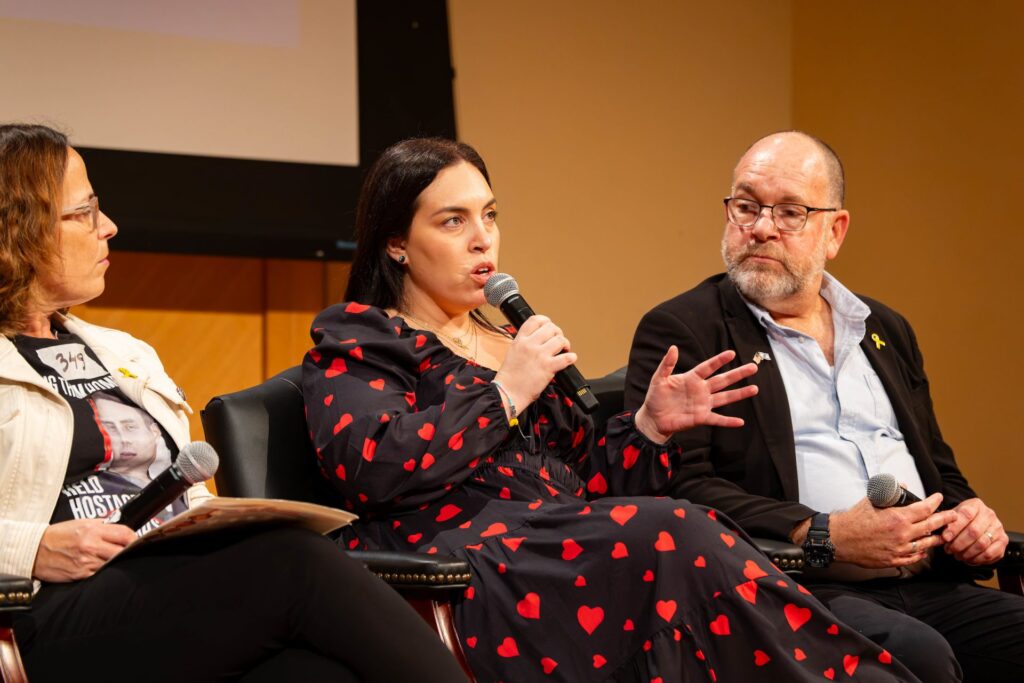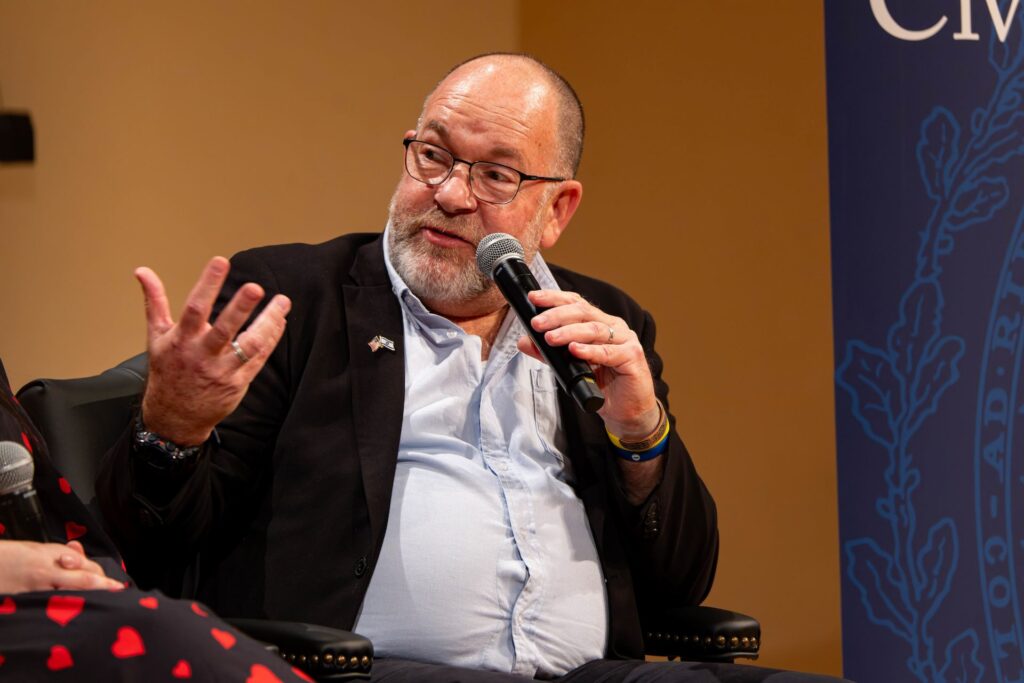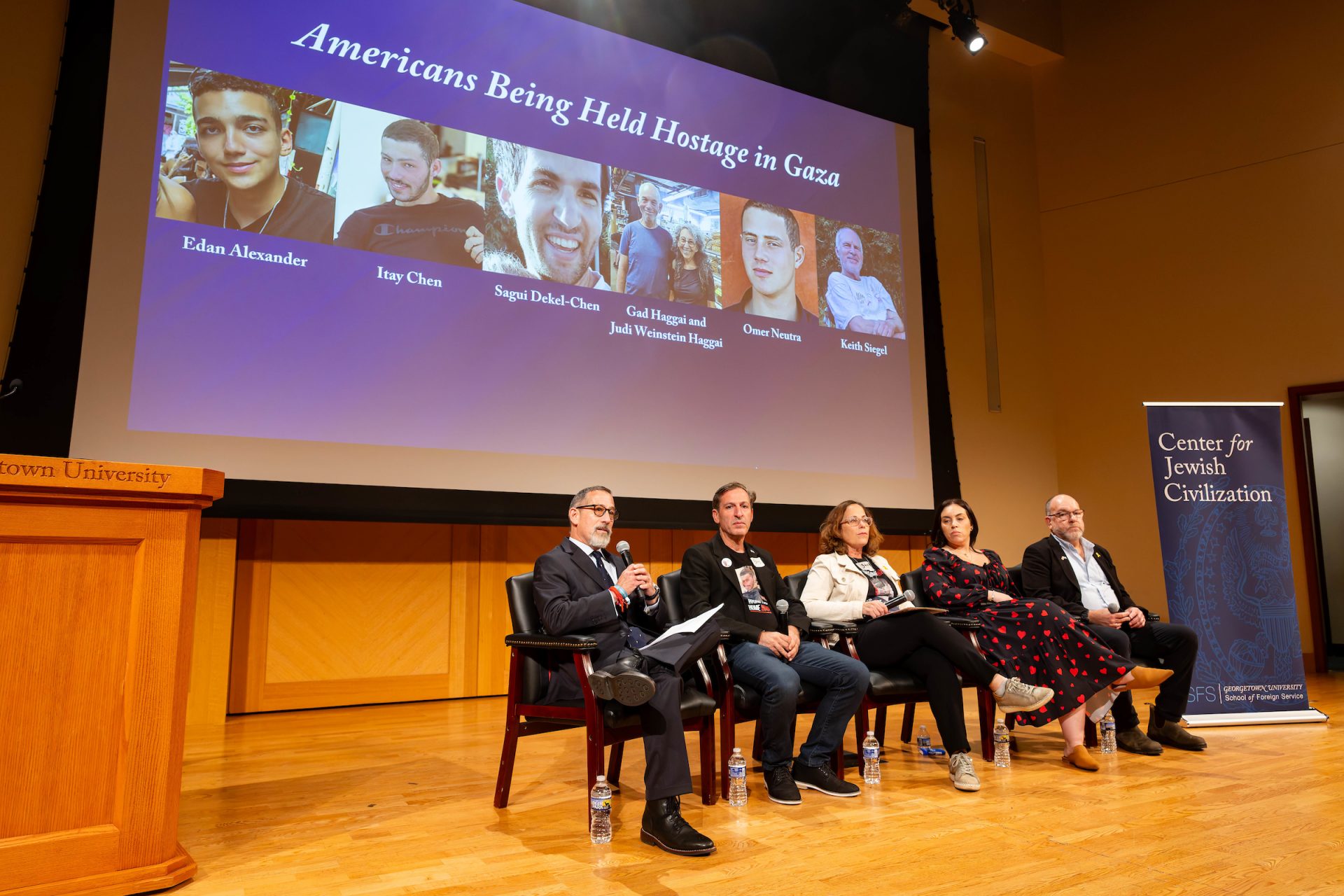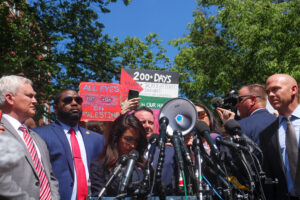Jonathan Dekel-Chen hopes that his son, Sagui, will meet his youngest daughter someday. She was born two months after Hamas attacked Israel on Oct. 7, killing 1,200 people and taking another 251 hostage.
The Israeli government estimates that 100 hostages are still held in Gaza, among them Sagui and six other U.S. citizens.
Dekel-Chen is one of the four family members of U.S. citizens held hostage by Hamas who participated in a panel titled “A Conversation with Families of Hostages in Gaza” on Sept. 19 in Lohrfink auditorium. The event was hosted by the Georgetown Center for Jewish Civilization (CJC) and was moderated by Bruce Hoffman, former director of the CJC and a professor at the School of Foreign Service. It was the first time that families of the hostages have spoken on a U.S. college campus, in the wake of widespread and contentious protests at universities across the country.
Dekel-Chen spoke passionately about the need for a hostage deal and ceasefire to bring his son back home.
“The simple matter is that the only way to stop this madness is not militarily. It is by a negotiated agreement that will accomplish two things: It will silence the guns, and it will release our captives,” Dekel-Chen said.
Hamas also took Orna Neutra’s 22-year-old son Omer Neutra, a soldier in the Israeli Defense Forces (IDF) stationed along the Gaza border. Neutra described Omer as friendly and a natural-born leader, and like Dekel-Chen, she has hope that her son is still alive. She spoke about the daily urgency to bring the hostages back home as the number of hostages killed in captivity grows—the Israeli government estimates that at least one third of the remaining hostages are dead. In late August, the IDF said it recovered the bodies of six hostages killed by Hamas, among them U.S. citizen Hersh Goldberg-Polin, which heightened the urgency of calls for a hostage deal.
“For us, it’s been urgent since day one. And this has been what we’ve been doing now for 349 days, and I have to remind myself what day it is today, because for us, it’s one long day. And we’ve been warning for almost a year now that it’s urgent,” Neutra said.
In addition to Dekel-Chen and Neutra, the event included Ruby Chen, father of 19-year-old Itay Chen, a soldier in the IDF who Hamas killed during the Oct. 7 attack. Hamas has not yet returned Itay’s body to his father, which has caused Chen great grief, given how important physical burial is in the Jewish tradition.
Hamas also killed Iris Liniado’s parents, Judy Weinstein and Gad Haggai, on Oct. 7, and continues to hold their bodies in Gaza. She described the moment she found out Hamas had killed them after over two months of uncertainty.
“After 83 days, we found out that they were both brutally murdered that day. Their bodies are currently held hostage as bargaining chips, which is incredibly inhumane,” Liniado said. “Our family is just looking for closure. In all religions, it’s something that must be done to let them come back to burial, give them the respect their souls deserve, give us the closure we need.”
 Photo courtesy of Georgetown University | School of Foreign Service
Photo courtesy of Georgetown University | School of Foreign Service
Neutra also shared her grief and the feeling that she doesn’t even have the ability to begin healing from the Oct. 7 attack until her son and all the hostages return.
“It’s like a part of your body is missing, and you can’t even start the healing process before they’re back,” she said.
The event did not just focus on the impact of the Oct. 7 attack on Israel and the importance of bringing the remaining Israeli hostages back home, but the speakers also said that countering Hamas is an issue of global security. Chen and Liniado said that Hamas is a danger not just to Israel, but also to the United States.
“The goal of this terror entity is to destroy Israel and all democracies, including America. So this is not Israel or Jews against Palestinians or Arabs. This is honestly a global threat against democracy,” Liniado said.
The panelists criticized the response of international organizations like the Red Cross, which has been sued by the families of some hostages for failing to visit the hostages and confirm that they are alive or administer medical care.
“It is mystifying and horrifying that international organizations have made the choice to not intervene and thereby not have to or to avoid any painful interactions and perhaps risky interactions along the way with Hamas.” Dekel-Chen said. “Orna and myself, who believe our sons are still alive, we have no confirmation because no international organization is willing to demand visits.”
The panelists were also critical of how the Israeli government has handled the situation, and made clear that they believe a negotiated agreement will bring their loved ones home, rather than airstrikes and bombings. Dekel-Chen referenced the recent mass protests in Tel Aviv of the government’s failure to return the hostages as evidence that many Israeli civilians disagree with the government’s handling of the war.
“Our own government was kind of deflecting saying, well, if we pressure Hamas more militarily, eventually they’ll come around. Israelis are perfectly aware, except for the staunchest supporters of our very right wing government, that was a fantasy to begin with, and certainly is now,” Dekel-Chen said.
 Photo courtesy of Georgetown University | School of Foreign Service
Photo courtesy of Georgetown University | School of Foreign Service
“Whether they’re executed by their Hamas captors to prevent them from being recovered or they die of neglect or friendly fire coming in from Israel—misplaced bombs—our hostages are dying and if we don’t act fast who knows how untold numbers of Palestinians are going to die needlessly,” Dekel-Chen continued.
Following Oct. 7, Israel launched an ongoing ground invasion and bombardment in Gaza that has killed over 40,000 Palestinians. The panelists said that they felt deeply for the innocent Palestinian civilians who Israel has killed in Gaza. But they emphasized that just calling for a ceasefire is not enough, either.
“If you are concerned about the Palestinian people truly, then you should call for the release of the hostages and for de-escalation in the region and for the end of this war. But just calling for an end of war, or against Israel, without acknowledging Hamas’ role in this, does not do justice, not to our cause and not to the Palestinian cause,” Neutra said.
Liniado, like Neutra, expressed sympathy and grave concern for the civilians in Gaza, and emphasized that the horrible conditions Israel has imposed on them should be considered a humanitarian crisis, just like the plight of the hostages. And most importantly, the return of loved ones should not be a political issue, she said.
“I think the key to all of this is to make sure that we bring our loved ones back home, start to heal somehow, both us in Israel, and the Palestinians in Gaza,” Liniado said. “We know this is a huge humanitarian issue. This is not politics.”







